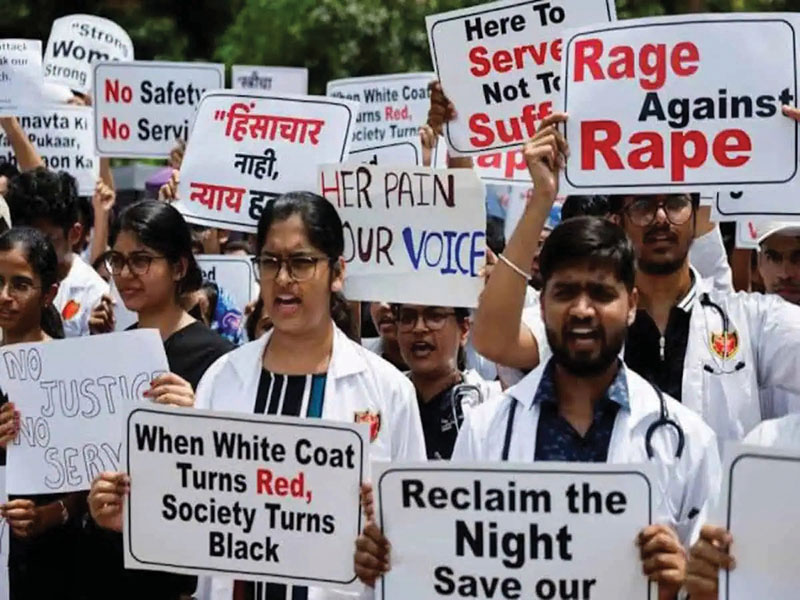West Bengal: Emerging reforms consensus
Baishali Mukherjee (Kolkata)
Seventy-one days after the angry Post Graduate Trainee (PGT) doctors’ movement which started on August 10 as a protest against official negligence that resulted in the horrific rape and murder of a 31-year-old trainee doctor at the government-run RG Kar Medical College and Hospital in Kolkata, the issue is still making media headlines in the city. Except that the movement has broadened into protests against negligent administration, inadequacy of medical infrastructure, security risk, corruption in hospital contracts and services, malpractices in academics, political control and exploitation of medical institutions, and appalling working conditions for junior and trainee doctors.
From RG Kar, the protest movement of PGI doctors has expanded to cover maladministration and corruption in over half a dozen medical colleges statewide. Allegations are flying thick and fast about doctors affiliated with the ruling Trinamool Congress’ (TMC) youth wing coercing students into participating in TMC political rallies, favouritism in examinations and hiring processes.
However a unique feature of these protest movements is that thus far, they have been apolitical. They have brought the educated middle class, civil society as well as the proletariat together. Consequently, some political pundits are predicting the exciting possibility of a united coalition of students, professionals and the common man, which could emerge as a political front that will clean up corrupt, exploitative party-based politics in Bengal.
With all her attempts to label the protest movement as a CPM, Congress or BJP conspiracy against the ruling TMC government failing, chief minister Mamata Banerjee has been obliged to concede some demands of the protesting doctors. On September 16, she accepted a five-point charter of demands placed before her and on October 1, she constituted a five-member inquiry committee headed by Sudeshna Gupta, senior special secretary of the health ministry, to investigate the demands. Meanwhile following complaints from Burdwan Medical College and Hospital (BMCH) trainee doctors, the dean of students’ welfare at BMCH has been transferred. Moreover, 7,051 CCTV cameras have been installed, 893 new duty rooms, and 778 washrooms have been added to 34 state government hospitals at a cost of Rs.113.
However, these concessions have not mollified all protesting trainee doctors. Citing delay in implementation of reforms, some of them started a fast-unto-death protest on October 4. The protesters’ charge that the “political system” is denying the common man the right to health, has evoked significant public support with eminent medical practitioners, authors, activists, actors and directors, as well as office-bearers of the Indian Medical Association (IMA) supporting their hunger strike. The protesting junior doctors’ charge that the system commercialises healthcare with the collusion of politicians and business interests, has struck a resonant chord within the intelligentsia.
Responding to the junior doctors’ hunger strike, Banerjee acquiesced to meet a delegation of 17 junior doctors on October 21. After a two-hour live streamed meeting at Nabanna, the state secretariat, she accepted their renewed demands, including removal of several state health ministry top brass from their positions, sanctioned another Rs.100 crore for infrastructure development in hospitals for doctors, reconstituting patient welfare committees, incorporating elected student representatives in the governing committees of medical colleges and hospitals, and establishing a special task force to respond to safety-security measures in hospitals.
Even cynical academics in Kolkata are according serious weightage to this sustained agitation of junior doctors. They highlight that student uprisings have often catalysed major social and political change worldwide. For instance, the 1960 Greensboro sit-in by Black students at Woolworths in the US diluted segregation laws; the Soweto uprising in South Africa in 1976 was pivotal in dismantling apartheid; in 1989, the Velvet Revolution in Czechoslovakia toppled the Communist regime. More recently, the anti-reservation student protest in Bangladesh upended the Sheikh Hasina government.
Therefore the consensus in Kolkata is that at the very least, real reforms in public health institutions and services are imminent.
Also read: West Bengal: Sets up committee to review medical examination system


















Add comment